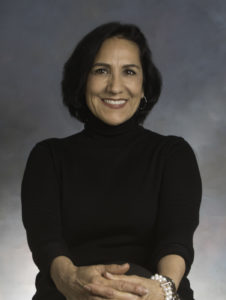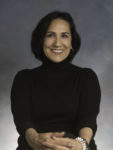 Julia Sylva is a graduate of Loyola Law School (1983, scholarship recipient) and California State University, Long Beach, wherein she earned a B.A. in Political Science, with a minor in Public Administration (1978). She has practiced law in California since 1983. In addition to her law career, Ms. Sylva also has an extensive political career which began in 1976 when she was elected to the City Council, City of Hawaiian Gardens. At the age of 20 years old; she is the youngest and first Latina elected to the City Council.
Julia Sylva is a graduate of Loyola Law School (1983, scholarship recipient) and California State University, Long Beach, wherein she earned a B.A. in Political Science, with a minor in Public Administration (1978). She has practiced law in California since 1983. In addition to her law career, Ms. Sylva also has an extensive political career which began in 1976 when she was elected to the City Council, City of Hawaiian Gardens. At the age of 20 years old; she is the youngest and first Latina elected to the City Council.

SS: Tell us a little about Cannabis Policy Institute?
JS: The Cannabis Policy Institute (CPI) was formed by me, and several visionary law students from Southwestern Law School, where I served as an Adjunct Professor. The Mission of CPI is to serve as a think tank for all legal and regulatory issues that govern commercial cannabis activity. We intend to publish law review articles and other scholarly publications to assist local public officials and the community-at-large to understand the evolution of commercial cannabis activity and the laws and regulations adopted by the State of California and the municipalities that apply in this industry (cannabispolicyinstitute.org).
SS: What types of projects do you focus on?
JS: I currently have the honor to serve as the Assistant City Attorney for the City of Maywood. The City Attorney and I attend all City Council and Planning Commission meetings. I assist with the preparation of the Agendas, Staff Reports, Resolutions, and Ordinances. I also, provide training related to the Political Reform Act, the Brown Act, the Public Records Act, and related governance topics. When necessary, I serve as litigation defense counsel and serve as co-trial counsel, along with the City Attorney. Additionally, I have many private clients, which I represent in matters related to land use, real estate, corporate formation and governance, and probate/estate planning.
SS: How do you add value to your clients?
JS: I provide undivided attention and hands-on professional legal services to my clients. All my clients have my personal cell phone number and are welcome to call me at any time, or visit me in my office, or I will visit them in their offices, as needed. Additionally, I have a network of lawyers and other professionals with expertise in diverse areas that I all upon, as needed, to discuss, analyze and find solutions to complex and novel issues.
SS: What is the most rewarding aspect of your career?
JS: I enjoy the mentorship I provide to my interns and law students. I especially appreciate seeing them grow as professionals. I also enjoy being a part of the policy development process for municipalities, and I find it very rewarding to assist and work with start-up businesses and entrepreneurs.
SS: What is the most challenging aspect of your career?
JS: The most challenging aspect of my career has always been–and continues to be—the juggling of the many personal and professional hats I wear on a daily basis. I am not just a lawyer; I am a mom, wife, professor, mentor, and entrepreneur. I also love to cook and am a Kundalini Yoga instructor. Each of these roles are significant and important to me, my family, my clients, and my students. I strive to be the best in everything I do, which can be challenging at times due to conflicting schedules, time constraints, deadlines, and the reshuffling of priorities throughout the day. Nonetheless, I enjoy getting up every morning to tackle the issues of the day and I love what I do!
SS: How has your educational background and work experience prepared you for success?
JS: I gained some of my most meaningful political and governmental experience by serving as Mayor (two terms) and as a Member of the City Council for the City of Hawaiian Gardens (1976-1980). This work enabled me to meet many wonderful people, many of whom I am still in contact with—professionally, politically and personally. As the Mayor, I traveled the country to seminars and conferences; I learned first-hand the role of an elected public official, which really helped to prepare me for my role as a city attorney. During my undergraduate years at California State University, Long Beach, I studied Political Science. Then, I attended Loyola Law School, Los Angeles. After my first year at Loyola, the Dean gave me an ultimatum: either finish law school or seek re-election. I believe I made the right choice to finish law school. My education at Loyola Law School has given me the opportunity to practice law, a very rewarding career, which I truly enjoy.
SS: What’s a recent project of which you’re particularly proud?
JS: I am proud to serve as founder and general counsel of CPI. It’s a very time-consuming project, but I believe the Institute will be a meaningful resource to the commercial cannabis industry, to policy-makers, and the general public. There’s nothing like the CPI, and I’m excited to see how it will continue to grow and evolve over time as a policy-maker in the various areas of focus.
SS: What challenges and new developments do you predict in your field?
JS: For CPI, the major challenges are related to federal law, including how that effects access to banking within cannabis industry. Commercial cannabis is here to stay—especially medicinal cannabis—and this is an exciting time to be involved. Municipalities need to learn how to regulate this industry, and businesses need to know how to navigate those regulations so that it can be a win/win situation for everyone involved. We are proud to say that we can, have, and will continue to assist in this effort.
SS: What competitive advantages can you offer to local governments and the business with which they partner?
JS: I believe that my experience as a former elected official and policy-maker provide a meaningful competitive advantage for me. I have over 35 years’ experience in local government and municipal law. I bring this background and experience to the table when I represent my public law and private clients. I offer practical advice to my public law clients that is not always a legal solution, but a public policy solution. I believe my public law clients appreciate and respect this relevant background and legal representation. As a result of this unique experience, I don’t really have any direct competition. And with the development of the think tank, I’m continually growing my resources and our institutional knowledge. There are no secrets to success. It is the result of preparation, hard work, and learning from failure.” — Colin Powell


